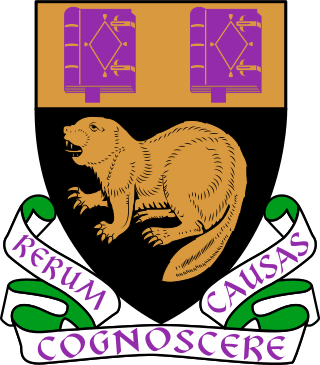
The London School of Economics and Political Science (LSE) is a public research university in London, England, and a member institution of the University of London. The school specialises in the social sciences. Founded in 1895 by Fabian Society members Sidney Webb, Beatrice Webb, Graham Wallas and George Bernard Shaw, LSE joined the University of London in 1900 and established its first degree courses under the auspices of the university in 1901. LSE began awarding its degrees in its own name in 2008, prior to which it awarded degrees of the University of London. It became a university in its own right within the University of London in 2022.

The Norwegian University of Science and Technology is a public research university in Norway and the largest in terms of enrollment. The university's headquarters is located in Trondheim, with regional campuses in Gjøvik and Ålesund.

Central European University is a private research university with a campus in Vienna and a non-degree, research and civic engagement presence in Budapest. The university offers graduate and undergraduate programs in the social sciences and humanities, which are accredited in Austria and the United States.
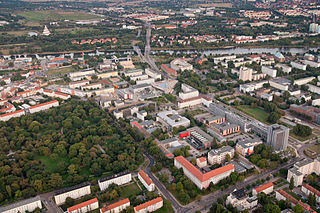
The Otto von Guericke University Magdeburg is a public research university founded in 1993 and is located in Magdeburg, the Capital city of Saxony-Anhalt. The university has about 13,000 students in nine faculties.
Tilburg University is a public research university specializing in the social and behavioral sciences, economics, law, business sciences, theology and humanities, located in Tilburg in the southern part of the Netherlands.

SGH Warsaw School of Economics is the oldest and most prestigious business school in Poland.

Danuta Maria Hübner is a Polish politician, diplomat, and economist and Member of the European Parliament. She was European Commissioner for Regional Policy from 22 November 2004 until 4 July 2009, when she resigned to become a Member of European Parliament for the Civic Platform. In 2012 Hübner became a member of the International Honorary Council of the European Academy of Diplomacy.

The economy of the European Union is the joint economy of the member states of the European Union (EU). It is the second largest economy in the world in nominal terms, after the United States, and the third largest at purchasing power parity (PPP), after China and the US. The European Union's GDP is estimated to be $20.50 trillion (nominal) in 2024 or $28.04 trillion (PPP), representing around one-sixth of the global economy. In 2023, Germany, France and Italy were the three largest economies in the European Union, accounting for approximately 53.1% of the EU's total GDP. Germany contributed 24.3%, while France accounted for 16.4 and Italy for 12.4%. In the same year, the social welfare expenditure of the European Union (EU) as a whole was 26.8% of its GDP.

The University of Erlangen–Nuremberg is a public research university in the cities of Erlangen and Nuremberg in Bavaria, Germany. The name Friedrich–Alexander is derived the university's first founder Friedrich, Margrave of Brandenburg-Bayreuth, and its benefactor Alexander, Margrave of Brandenburg-Ansbach.

Anna Diamantopoulou is a Greek civil engineer and politician of the Panhellenic Socialist Movement (PASOK) who currently serves as president of the Athens-based think tank "DIKTIO" Network for Reform in Greece and Europe.

The European University Institute (EUI) is an international postgraduate and post-doctoral research-intensive university and an intergovernmental organisation with juridical personality, established by its founding member states to contribute to cultural and scientific development in the social sciences, in a European perspective. Its main campus is located in the hills above Florence in Fiesole, Italy.

Tata Institute of Social Sciences (TISS) is a multi-campus public university in Mumbai, India. It is Asia's oldest institute for professional social work education and was founded in 1936 in the then Bombay Presidency of British India as the Sir Dorabji Tata Graduate School of Social Work by the Sir Dorabji Tata Trust. In 1944, the institute was officially renamed the Tata Institute of Social Sciences and in 1964, the Government of India declared TISS a deemed university under Section 3 of the University Grants Commission Act (UGC), 1956.

The European School of Economics (ESE) is a private college of higher education. It is accredited by ASIC, validated by Richmond, The American International University in London, and is an officially approved Learning Provider. ESE offers UK bachelor's degree, master's degree, MBA, and specialised short programmes at its centres in London, Rome, Milan, Florence, and Madrid.

The Hertie School is a German private, independent graduate school for governance located in Berlin. Hertie School is accredited to confer master's and doctoral degrees. Half of the school's students are international, with more than 95 countries represented among alumni and currently enrolled students. The working language is English.

IE University, known as IE Universidad or Universidad Instituto de Empresa, is a private university with campuses in Madrid, Community of Madrid, and Segovia, Castile and León (Spain), that formed as an outgrowth of IE Business School originally founded as the Instituto de Empresa (IE). IE University's programs are run in English and Spanish, and are compliant with the terms of the European Higher Education Area.
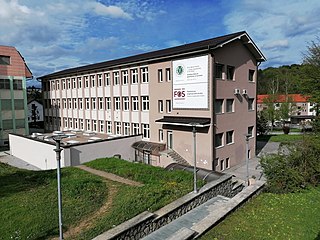
The Faculty of Organisation Studies in Novo Mesto is an independent (private) faculty, in Novo Mesto, Slovenia. The Faculty of Organisation Studies in Novo Mesto holds ISO standards ISO 9001 and ISO/IEC 27001. In 2015, the Faculty was recognised by the Information Commissioner of the Republic of Slovenia for its efforts in the field of personal data protection.

Universidad Isabel I (ui1), also known as University Isabel I of Castile or University Isabel I, is a private, state-recognized university located in Burgos, Spain which offers studies in business, law, economics, humanities and health science degrees mainly for working professionals and trainees via blended learning and distance learning.
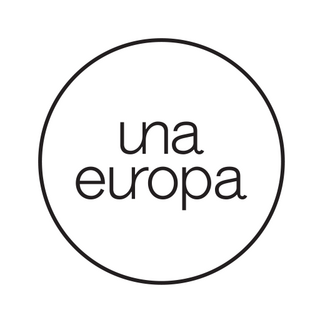
Una Europa is an international network of European research-intensive universities. Launched in early 2019, the alliance is headquartered in Brussels, Belgium and connects eleven universities, nine of which are in the European Union. Taken together, the participating universities teach more than 500,000 students with 80,000 staff.
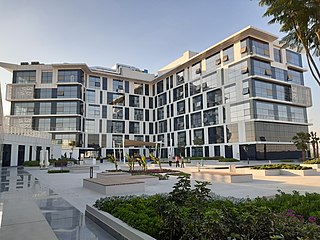
The European Universities in Egypt is a University Institution in the New Administrative Capital. The institution was launched in accordance with Law No. 162/2018 on the Establishment and Organization of International Branch Campuses (IBCs) within The Arab Republic of Egypt and University Institutions, the Minister of Higher Education and Scientific Research Decree No. 4200/2018 and the President's Decree No. 86/2021.

The European University of Technology (EUt+) was founded under 2020 Erasmus + call and is an alliance of nine European technological universities across nine countries each with its own campuses, collectively educating 100,000 students. EUt+ aims to develop an integrated model of technological education and research that includes engineering, sciences, humanities and social sciences disciplines, aiming to develop and offer joint European degrees in engineering by self-customized multicampus curricula.


















